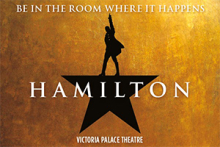What more is there for critics to say about Hamilton?
As the opening night of ”Hamilton” approaches, Matt Trueman looks at the pitfalls of reviewing a global theatrical phenomenon
How does a lowly critic, late to the party by a
Long way, dropped in the middle of a
Grade-A, runaway mega-hit, well-praised by other crits
and better wits, repeatedly
Protect from being swayed, repeating what they say?
Hamiton, it’s fair to say, presents us critics with a conundrum. When it opens next week, it’s our job to meet it head on, and yet its hard to think of any piece of theatre – certainly any new piece of theatre – with quite such a cemented or well-documented reputation.
Lin-Manuel Miranda‘s musical is a masterpiece already. It’s been crowned as such so many times, it’s hard to argue anything else. The New York Times critic Ben Brantley advised us to sell a kid to see it. Stephen Sondheim called it "a breakthrough". Michelle Obama rates it as the best piece of art she’s ever seen. Hip hop pioneer Black Thought of The Roots, who produced The Hamilton Mixtape, recalled "trying to improve on perfection". Between them, that lot cover most bases. It’s fair to say they know what they’re talking about. Hamilton‘s quality is hardly in doubt.
Hamilton has already blown us all away
That’s not to mean we can’t like it, but, really I don’t need any of them to tell me what I think about Hamilton. There may be critics out there that haven’t spent the last year or so listening to it on repeat, but I’m not one of them. Several tracks wound up on my most played Spotify playlist this month. They’ve bored their way into my brain. Were I any sort of a rapper (reader, I’m not), I might be word perfect by now. In short, I know what I’m going into next week. Unless they’ve been dropped under a rock in a forgotten spot these last four years, everyone does. Hamilton‘s already blown us all away.
And it’s been analysed almost to death. Last year, some 176 New York Times articles mentioned the musical – one every other day, on average. Commentators have registered its impact on musical theatre, picked apart its post-racial politics, analysed the intricacies of its lyrics and heralded its historical significance. Read the Wall Street Journal's breakdown. Read Professor Sarah Churchwell's account. Read The New Yorker's take on its politics.
I’ve spent the last fortnight poring over the so-called Hamiltome – Jeremy McCarter’s epic piece of embedded criticism, Hamilton: the Revolution. Over 300-odd pages, it tells the story of Hamilton‘s creation, profiles its cast members and creative team and unpicks its various component parts – all alongside Lin-Manuel’s own annotated lyrics.
If Hamilton‘s quality isn’t in question, what are we even writing reviews for?
For the Hamilton obsessive, it’s an extraordinary, encyclopaedic read; the equivalent of taking a microscope to the show. It flags every nod to Sondheim or Tupac, Gilbert and Sullivan or Busta Rhymes. McCarter makes clear all the multiplicities in Miranda’s wordplay, the internal rhymes that give his raps their rhythms and the motifs that recur through his core. Frankly, you finish the book in awe, marvelling at Miranda’s many talents – the complexity of his lyrics, the intricacy of his songwriting and the efficacy of his storytelling, not to mention the contributions of his core collaborative team.
Back to next week – to borrow one of Burr’s lines – We all know what we know. Hamilton‘s pretty good. It much goes without saying.
Hence, the critical conundrum. If Hamilton‘s quality isn’t in question, if it’s a known-commodity, if everything's already been said, what are we even writing reviews for?
Well, a few things. The first, self-evident though it sounds, is to report on the British premiere – a very specific cultural event. This is the first Hamilton to have left the nation he helped found and it’s our job to ask how the show stacks up without the same underpinnings of national identity.
Will London take it to heart in the same way?
We Brits aren’t taught Hamilton in our school history lessons. His face doesn’t stare back at us out of bank notes. If we know his life story in any detail at all, chances are it’s because we’ve been listening to our Lin. This isn’t, in short, our nation myth and its revisions and radical gestures (casting in particular) won’t necessarily register in quite the same way. More specifically, Hamilton‘s a New York show to its core: "The greatest city in the world," so its sings. Will London take it to heart in the same way? We might be able to watch Hamilton in wonder, but will we feel it in the same way? Will it resonate as it did with Americans?
Really, it’s all about the room where it happens. No matter how many times one’s listened to the cast album, no matter how word-perfect one sings the songs, there’s no knowing what Hamilton really is without watching it live. We might know what it looks like – those iconic cream breeches and blue cavalier coats – but we don’t know how it moves. I’m not just talking about Thomas Kail’s direction and Andy Blankenbuehler’s choreography – the forces that animate Hamilton onstage – but about its emotional impact. I want to know how Hamilton‘s heart beats; what it feels like to sit with that story for three or so hours as it plays out onstage.
One passage in the Hamiltome drove that home. As the show moves into its Broadway home, the Richard Rodgers Theater, McCarter describes a new addition: two vast subwoofer bass speakers that shake the auditorium when unleashed. You won’t get that from playing the cast album at home.
That, really, is all there is to criticism. It's our job, as writers, to take you there and give a sense of what it is to share a space with a show. Hamilton‘s no different in that regard. We’ll tell the story of tonight.

















